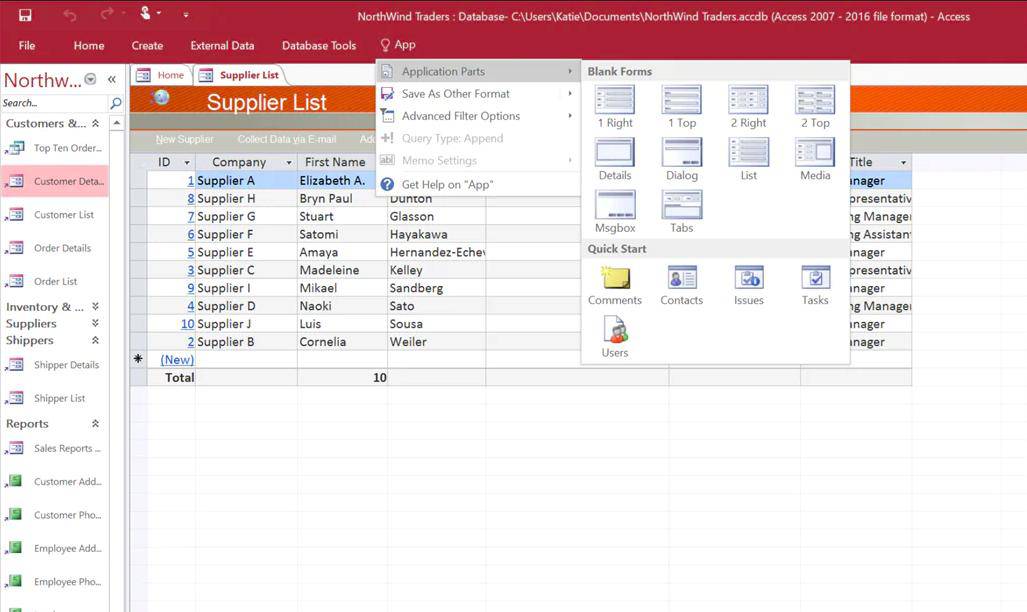
Multiple files can be attached per record. Here are some of the other more specialized data types, you can choose from in Access. The text field is referred to as short text and your memo field is now called long text. In previous versions of Access these data types were called text and memo.

In Access 2013, we now have two data types - short text and long text. If you use previous versions of Access, you will notice a difference for two of those data types. Yes and No values and fields that contain only one of two values (Yes/No, True/False, or On/Off). Numeric data used in mathematical calculations.ġ, 2, 4, or 8 bytes (16 bytes if set to Replication ID).ĭate and time values for the years 100 through 9999.Ĭurrency values and numeric data used in mathematical calculations involving data with one to four decimal places.Ī unique sequential (incremented by 1) number or random number assigned by Microsoft Access whenever a new record is added to a table.Ĥ bytes (16 bytes if set to Replication ID). Lengthy text or combinations of text and numbers. Text or combinations of text and numbers, including numbers that do not require calculating (e.g. Here are some of the most common data types you will find used in a typical Microsoft Access database.
Each field can store data consisting of only a single data type. The data type determines the kind of the values that users can store in any given field. MS Access supports different types of data, each with a specific purpose. A field's data type determines what kind of data it can store. The most important property for a field is its data type. ORDER BY Switch(MsysObjects.Type=1,"Local Table",MsysObjects.Type=4,"Linked ODBC Table",MsysObjects.Type=5,"Query",MsysObjects.Type=6,"Linked Table",MsysObjects.Type=-32768,"Form",MsysObjects.Type=-32764,"Report",MsysObjects.Type=-32766,"Macro",MsysObjects.Type=-32761,"VBA Module"), MsysObjects.Type, MsysObjects.Every field in a table has properties and these properties define the field's characteristics and behavior. SELECT MsysObjects.Name AS, MsysObjects.Type, Switch(MsysObjects.Type=1,"Local Table",MsysObjects.Type=4,"Linked ODBC Table",MsysObjects.Type=5,"Query",MsysObjects.Type=6,"Linked Table",MsysObjects.Type=-32768,"Form",MsysObjects.Type=-32764,"Report",MsysObjects.Type=-32766,"Macro",MsysObjects.Type=-32761,"VBA Module") AS WHERE (((MsysObjects.Name) Not Like "~*" And (MsysObjects.Name) Not Like "MSys*")) SELECT MsysObjects.Name AS, MsysObjects. Super post – and great domain by the way:-) MS Access Forms MS Access Queries MS Access Report MS Access Tables 16 responses on “ MS Access – Listing of Database Objects (Tables, Queries, Forms, Reports, …)” Below is what I could find from various sources or identify myself as what these values meant. This field provides an Attribute value which represents extra information about the object itself. You may also notice that in the MsysObjects table there is a Flags field. List of Database Queries More Object Types You SayĪbove I gave the listing of the common object type, those that 99% of people might be interested in, that said, for those of you trying to understand it all, below is a more complete listing Object Type You may also be interested in the following VBA approaches: , vbOKOnly + vbCritical, "An Error has Occurred!" If Not db Is Nothing Then Set db = Nothing , vbOKOnly + vbCritical, "An Error has Occurred!" Resume Error_Handler_Exitĭim sSQL As String sSQL = "SELECT MsysObjects.Name AS " & vbCrLf & _ 
Switch(Erl = 0, "", Erl 0, vbCrLf & "Line No: " & Erl) _ "Error Description: " & Err.Description & _ "Error Number: " & Err.Number & vbCrLf & _ MsgBox "The following error has occurred" & vbCrLf & vbCrLf & _

Close Set rs = Nothing End If If Not db Is Nothing Then Set db = Nothing Exit Function On Error Resume Next If Not rs Is Nothing Then Set rs = db.OpenRecordset(sSQL, dbOpenSnapshot) " ORDER BY MsysObjects.Name " Set db = CurrentDb " AND (MsysObjects.Type=" & lObjectType & "))" & vbCrLf & _

" WHERE (((MsysObjects.Name Not Like '~*') And (MsysObjects.Name Not Like 'MSys*'))" & vbCrLf & _ SSQL = "SELECT MsysObjects.Name AS " & vbCrLf & _ End Enum Function ListObjects(lObjectType As ObjectType)








 0 kommentar(er)
0 kommentar(er)
